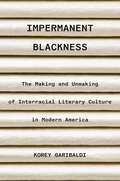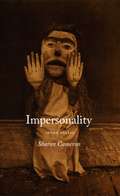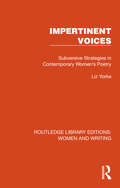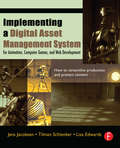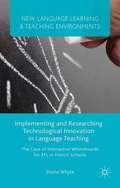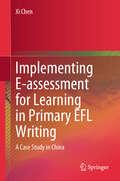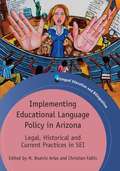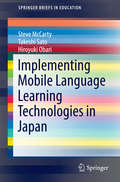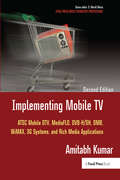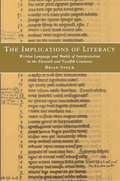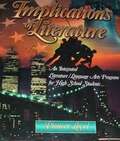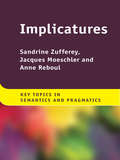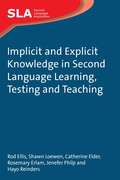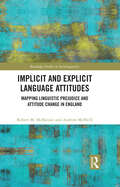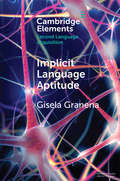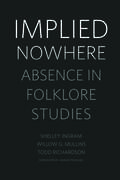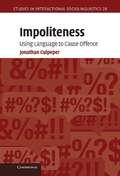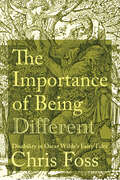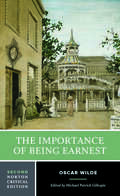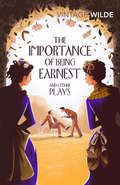- Table View
- List View
Impermanent Blackness: The Making and Unmaking of Interracial Literary Culture in Modern America
by Korey GaribaldiRevisiting an almost-forgotten American interracial literary culture that advanced racial pluralism in the decades before the 1960sIn Impermanent Blackness, Korey Garibaldi explores interracial collaborations in American commercial publishing—authors, agents, and publishers who forged partnerships across racial lines—from the 1910s to the 1960s. Garibaldi shows how aspiring and established Black authors and editors worked closely with white interlocutors to achieve publishing success, often challenging stereotypes and advancing racial pluralism in the process.Impermanent Blackness explores the complex nature of this almost-forgotten period of interracial publishing by examining key developments, including the mainstream success of African American authors in the 1930s and 1940s, the emergence of multiracial children’s literature, postwar tensions between supporters of racial cosmopolitanism and of “Negro literature,” and the impact of the Civil Rights and Black Power movements on the legacy of interracial literary culture.By the end of the 1960s, some literary figures once celebrated for pushing the boundaries of what Black writing could be, including the anthologist W. S. Braithwaite, the bestselling novelist Frank Yerby, the memoirist Juanita Harrison, and others, were forgotten or criticized as too white. And yet, Garibaldi argues, these figures—at once dreamers and pragmatists—have much to teach us about building an inclusive society. Revisiting their work from a contemporary perspective, Garibaldi breaks new ground in the cultural history of race in the United States.
Impersonal Enunciation, or the Place of Film (Film and Culture Series)
by Christian MetzChristian Metz is best known for applying Saussurean theories of semiology to film analysis. In the 1970s, he used Sigmund Freud's psychology and Jacques Lacan's mirror theory to explain the popularity of cinema. In this final book, Metz uses the concept of enunciation to articulate how films "speak" and explore where this communication occurs, offering critical direction for theorists who struggle with the phenomena of new media. If a film frame contains another frame, which frame do we emphasize? And should we consider this staging an impersonal act of enunciation? Consulting a range of genres and national trends, Metz builds a novel theory around the placement and subjectivity of screens within screens, which pulls in—and forces him to reassess—his work on authorship, film language, and the position of the spectator. Metz again takes up the linguistic and theoretical work of Benveniste, Genette, Casetti, and Bordwell, drawing surprising conclusions that presage current writings on digital media. Metz's analysis enriches work on cybernetic emergence, self-assembly, self-reference, hypertext, and texts that self-produce in such a way that the human element disappears. A critical introduction by Cormac Deane bolsters the connection between Metz's findings and nascent digital-media theory, emphasizing Metz's keen awareness of the methodological and philosophical concerns we wrestle with today.
Impersonal Passion: Language As Affect
by Denise RileyDenise Riley is renowned as a feminist theorist and a poet and for her remarkable refiguring of familiar but intransigent problems of identity, expression, language, and politics. In Impersonal Passion, she turns to everyday complex emotional and philosophical problems of speaking and listening. Her provocative meditations suggest that while the emotional power of language is impersonal, this impersonality paradoxically constitutes the personal. In nine linked essays, Riley deftly unravels the rhetoric of life's absurdities and urgencies, its comforts and embarrassments, to insist on the forcible affect of language itself. She teases out the emotional complexities of such quotidian matters as what she ironically terms the right to be lonely in the face of the imperative to be social or the guilt associated with feeling as if you're lying when you aren't. Impersonal Passion reinvents questions from linguistics, the philosophy of language, and cultural theory in an illuminating new idiom: the compelling emotion of the language of the everyday.
Impersonality: Seven Essays
by Sharon CameronPhilosophers have long debated the subjects of person and personhood. Sharon Cameron ushers this debate into the literary realm by considering impersonality in the works of major American writers and figures of international modernism—writers for whom personal identity is inconsequential and even imaginary. In essays on William Empson, Jonathan Edwards, Ralph Waldo Emerson, Herman Melville, T. S. Eliot, and Simone Weil, Cameron examines the impulse to hollow out the core of human distinctiveness, to construct a voice that is no one’s voice, to fashion a character without meaningful attributes, a being that is virtually anonymous. “To consent to being anonymous,” Weil wrote, “is to bear witness to the truth. But how is this compatible with social life and its labels?” Throughout these essays Cameron examines the friction, even violence, set in motion from such incompatibility—from a “truth” that has no social foundation. Impersonality investigates the uncompromising nature of writing that suspends, eclipses, and even destroys the person as a social, political, or individual entity, of writing that engages with personal identity at the moment when its usual markers vanish or dissolve.
Impertinent Voices: Subversive Strategies in Contemporary Women's Poetry (Routledge Library Editions: Women and Writing)
by Liz YorkeHow do women’s poetic voices disrupt cultural forms? What is the relationship between female desire and the structures of poetry? Is ‘writing the body’ essentialist? Originally published in 1991, Impertinent Voices explores these questions in a sensitive and challenging study of female poetic strategies. Looking closely at the intricate and disturbing poetry of some of the twentieth century’s greatest poets – Sylvia Plath, Adrienne Rich, H. D., Audre Lorde – Liz Yorke uses the theories of Irigaray, Cixous and Kristeva to illuminate her own clear and original analyses of the ways in which feminist understandings have been produced within poetic and cultural forms. Although they struggle with a language which has traditionally excluded female sexuality and subjectivity, women poets refuse to be silenced. Their ‘impertinent’ voices break out of the constraining myths of the prevailing culture, precipitating new beginnings and new ways of looking at the world. Detailed close readings of the poems are here matched with a clear theoretical approach, making this both an exciting exploration of new terrain and an excellent introduction to the ways in which, for women writers, theoretical models and creative practice work hand in hand.
Implementing a Digital Asset Management System: For Animation, Computer Games, and Web Development
by Lisa Edwards Jens Jacobsen Tilman SchlenkerLearn how the top CG film, computer game and web development companies have saved significant time and money on their projects by optimizing digital asset management systems and streamlining production processes. Also included is a product overview with 28 detailed descriptions of software solutions, including screenshots and prices, as well as a practical assessment of their suitability for different industries & project sizes.
Implementing and Researching Technological Innovation in Language Teaching
by Shona WhyteImplementing and Researching Technological Innovation in Language Teaching takes a case study approach to investigate the integration of the interactive whiteboard (IWB) into the teaching of English as a Foreign Language (EFL) in French schools. The study highlights the advantages of collaborative action research for stimulating and supporting language teachers in innovative experimentation, and seeks to enhance our understanding of the challenges and opportunities inherent in this process. Utilising a framework which can inform further research into innovative practices with other interactive technologies, this book offers a research design and instruments suitable for assessing classroom adoption of the IWB. In this way, the study provides insights into general processes of technological innovation in language teaching and learning which is of relevance to further research and teacher development in today's new learning environments.
Implementing E-assessment for Learning in Primary EFL Writing: A Case Study in China
by Xi ChenThis book examines how e-assessment can be implemented in primary English as a Foreign Language (EFL) writing in an examination-oriented context. It provides valuable insights on e-assessment for learning (E-AfL) to teacher educators and teachers in both local and global contexts, especially teacher educators undertaking professional development programs of assessment in examination-oriented contexts. For researchers and graduate students who are interested in e-assessment for learning (E-AfL) and writing assessment, this book provides them with valuable resources to further their understanding of E-AfL research and broadens writing assessment scholarship. For pre- and in-service teachers and program administrators, the book serves as a practical and accessible guidebook, proffering effective guidance to empower teacher learning of assessment and to apply pedagogic principles to assessment design.
Implementing Educational Language Policy in Arizona
by Christian Faltis M. Beatriz AriasThis volume is a unique contribution to the study of language policy and education for English Learners because it focuses on the decade long implementation of "English Only" in Arizona. How this policy influences teacher preparation and classroom practice is the central topic of this volume. Scholars and researchers present their latest findings and concerns regarding the impact that a restrictive language policy has on critical areas for English Learners and diverse students. If a student's language is sanctioned, do they feel welcome in the classroom? If teachers are only taught about subtractive language policy, will they be able to be tolerant of linguistic diversity in their classrooms? The implications of the chapters suggest that Arizona's version of Structured English Immersion may actually limit English Learners' access to English.
Implementing Mobile Language Learning Technologies in Japan
by Steve Mccarty Hiroyuki Obari Takeshi SatoThis book explores theoretical and practical aspects of implementing mobile language learning in university classrooms for English as a Foreign Language in Japan. The technologies utilized, such as smartphones, iPads, and wi-fi, integrate students' hand-held devices into the campus network infrastructure. The pedagogical aims of ubiquitous mobile learning further incorporate social media, blended learning, and flipped classroom approaches into the curriculum. Chapter 1 defines mobile language learning within dimensions of e-learning and technology-assisted language learning, prior to tracing the development of mobile learning in Japan. Chapter 2 documents the sociocultural theory underpinning the authors' humanistic approach to implementation of mobile technologies. The sociocultural pedagogy represents a global consensus of leading educators that also recognizes the agency of Asian learners and brings out their capability for autonomous learning. Case studies of universities, large and small, public and private, are organized similarly in Chapters 3 to 5. Institutional/pedagogical and technological context sections are followed by detailed content on the implementation of initiatives, assessment of effectiveness, and recommendations for other institutions. Distinct from a collection of papers, this monograph tells a story in brief book length about theorizing and realizing mobile language learning, describing pioneering and original initiatives of importance to practitioners in other educational contexts.
Implementing Mobile TV: ATSC Mobile DTV, MediaFLO, DVB-H/SH, DMB,WiMAX, 3G Systems, and Rich Media Applications (Focal Press Media Technology Professional Ser.)
by Amitabh KumarImplement state-of-the-art Mobile TV networks with this comprehensive guide to the latest technologies and standards, including MediaFLO, ATSC Mobile DTV, and CMMB, the same technologies seeing large-scale rollouts today around the world. You not only gain deep insight into the maze of technologies, but also the principles of mobile content-what makes it work, how it's produced, repurposed and delivered securely, and how it integrates with mobile and Internet domains. Learn about the key enablers of a mobile TV service, like smartphones, chipsets, and mobile software. Gain access to a detailed look at the networks deployed worldwide with real-world case studies. The informative diagrams provide rich visualization of the new technologies, services, and revenue models. Gain understanding of how mobile TV can be made interactive and how it can be delivered seamlessly in multiple markets. Get insight into the growing capabilities of multimedia handsets and software which drives innovative applications. Author Amitabh Kumar begins with the basics of mobile multimedia and progresses to cover details of technologies, networks, and firmware for mobile TV services. Easy to follow, Implementing Mobile TV features a rich presentation that includes dozens of FAQs and "Quick Facts." This new edition is updated to reflect the quickly evolving world of Mobile TV, focusing on factors for success and providing understanding of:
The Implicated Subject: Beyond Victims and Perpetrators (Cultural Memory in the Present)
by Michael RothbergWhen it comes to historical violence and contemporary inequality, none of us are completely innocent. We may not be direct agents of harm, but we may still contribute to, inhabit, or benefit from regimes of domination that we neither set up nor control. Arguing that the familiar categories of victim, perpetrator, and bystander do not adequately account for our connection to injustices past and present, Michael Rothberg offers a new theory of political responsibility through the figure of the implicated subject. The Implicated Subject builds on the comparative, transnational framework of Rothberg's influential work on memory to engage in reflection and analysis of cultural texts, archives, and activist movements from such contested zones as transitional South Africa, contemporary Israel/Palestine, post-Holocaust Europe, and a transatlantic realm marked by the afterlives of slavery. As these diverse sites of inquiry indicate, the processes and histories illuminated by implicated subjectivity are legion in our interconnected world. An array of globally prominent artists, writers, and thinkers—from William Kentridge, Hito Steyerl, and Jamaica Kincaid, to Hannah Arendt, Primo Levi, Judith Butler, and the Combahee River Collective—speak to this interconnection and show how confronting our own implication in difficult histories can lead to new forms of internationalism and long-distance solidarity.
The Implications of Literacy: Written Language and Models of Interpretation in the 11th and 12th Centuries
by Brian StockThis book explores the influence of literacy on eleventh and twelfth-century life and though on social organization, on the criticism of ritual and symbol, on the rise of empirical attitudes, on the relationship between language and reality, and on the broad interaction between ideas and society.Medieval and early modern literacy, Brian Stock argues, did not simply supersede oral discourse but created a new type of interdependence between the oral and the written. If, on the surface, medieval culture was largely oral, texts nonetheless emerged as a reference system both for everyday activities and for giving shape to larger vehicles of interpretation. Even when texts were not actually present, people often acted and behaved as if they were.The book uses methods derived from anthropology, from literary theory, and from historical research, and is divided into five chapters. The first treats the growth and shape of medieval literacy itself. Theo other four look afresh at some of the period's major issues--heresy, reform, the Eucharistic controversy, the thought of Anselm, Abelard, and St. Bernard, together with the interpretation of contemporary experience--in the light of literacy's development. The study concludes that written language was the chief integrating instrument for diverse cultural achievements.
Implications Of Literature: Pioneer Level
by Deborah SchechterReadings in the American Experience An Integrated Literature / Language Arts Program for High School Students
Implications of Literature, Trailblazer Level: An Integrated Literature/Language Arts Program for High School Students (Student Edition)
by TextWord Press StaffThis publication of the Trailblazer Level of the Implications of Literature Anthology Series marks the completion of the TextWord Press four-year literature series for high-school students. This fourth volume in the series surveys approximately 1500 years of English Literature. In this text you will come to understand how the English that we speak so comfortably today developed from Old English--a language that today is incomprehensible to almost everyone but scholars.
Implicatures (Key Topics in Semantics and Pragmatics)
by Sandrine Zufferey Jacques Moeschler Anne ReboulAn accessible and thorough introduction to implicatures, a key topic in all frameworks of pragmatics. Starting with a definition of the various types of implicatures in Gricean, neo-Gricean and post-Gricean pragmatics, the book covers many important questions for current pragmatic theories, namely: the distinction between explicit and implicit forms of pragmatic enrichment, the criteria for drawing a line between semantic and pragmatic meaning, the relations between the structure of language (syntax) and its use (pragmatics), the social and cognitive factors underlying the use of implicatures by native speakers, and the factors influencing their acquisition for children and second language learners. Written in non-technical language, Implicatures will appeal to students and teachers in linguistics, applied linguistics, psychology and sociology, who are interested in how language is used for communication, and how children and learners develop pragmatic skills.
Implicit and Explicit Knowledge in Second Language Learning, Testing and Teaching
by Rod Ellis Shawn LoewenThe implicit/explicit distinction is central to our understanding of the nature of L2 acquisition. This book begins with an account of how this distinction applies to L2 learning, knowledge and instruction. It then reports a series of studies describing the development of a battery of tests providing relatively discrete measurements of L2 explicit/ implicit knowledge. These tests were then utilized to examine a number of key issues in SLA - the learning difficulty of different grammatical structures, the role of L2 implicit/ explicit knowledge in language proficiency, the relationship between learning experiences and learners' language knowledge profiles, the metalinguistic knowledge of teacher trainees and the effects of different types of form-focused instruction on L2 acquisition. The book concludes with a consideration of how the tests can be further developed and applied in the study of L2 acquisition.
Implicit and Explicit Language Attitudes: Mapping Linguistic Prejudice and Attitude Change in England (Routledge Studies in Sociolinguistics)
by Robert M. McKenzie Andrew McNeillThis timely volume constitutes the first book-length account of implicit as well as explicit language attitudes. It details the findings of a large-scale study, incorporating cutting-edge implicit and self-report instruments adapted from social psychology, investigating the evaluations of over 300 English nationals of the status and social attractiveness of Northern English and Southern English speech in England. The book is unique in its examination of implicit-explicit attitude divergence, across a range of social factors, to identify the direction of language attitude change in progress and the particular social groups leading attitude change. The volume provides a comprehensive understanding of language-based prejudice in England and the study paves the way for researchers to employ newly developed implicit and explicit measures to investigate language attitudes and language attitude change in a range of contexts. This book is invaluable for researchers in sociolinguistics and applied linguists interested in theoretical and methodological aspects of linguistic prejudice and language variation and change. It is also essential reading for social psychologists with an interest in attitudes, attitude change and prejudice.
Implicit and Explicit Language Attitudes: Mapping Linguistic Prejudice and Attitude Change in England (Routledge Studies in Sociolinguistics)
by Robert M. McKenzie Andrew McNeillThis timely volume constitutes the first book-length account of implicit as well as explicit language attitudes. It details the findings of a large-scale study, incorporating cutting-edge implicit and self-report instruments adapted from social psychology, investigating the evaluations of over 300 English nationals of the status and social attractiveness of Northern English and Southern English speech in England.The book is unique in its examination of implicit-explicit attitude divergence, across a range of social factors, to identify the direction of language attitude change in progress and the particular social groups leading attitude change. The volume provides a comprehensive understanding of language-based prejudice in England and the study paves the way for researchers to employ newly developed implicit and explicit measures to investigate language attitudes and language attitude change in a range of contexts.This book is invaluable for researchers in sociolinguistics and applied linguists interested in theoretical and methodological aspects of linguistic prejudice and language variation and change. It is also essential reading for social psychologists with an interest in attitudes, attitude change and prejudice.
Implicit Language Aptitude (Elements in Second Language Acquisition)
by Gisela GranenaIt is a well-known fact that some adult second language learners learn more rapidly and/or to a higher level of proficiency than others. Some of these individual differences have been linked to differences in cognitive and perceptual abilities under the umbrella term of 'language aptitude'. The notion of language aptitude has undergone recent developments, one of which is the proposal that language aptitude includes cognitive abilities that involve implicit processes and that are advantageous in learning a language without awareness. This Element defines implicit language aptitude, examines tasks that can be used to measure implicit language aptitude, and provides an overview of relevant research in this area.
Implied Nowhere: Absence in Folklore Studies
by Shelley Ingram Willow G. Mullins Todd RichardsonIn Implied Nowhere: Absence in Folklore Studies, authors Shelley Ingram, Willow G. Mullins, and Todd Richardson talk about things folklorists don’t usually talk about. They ponder the tacit aspects of folklore and folklore studies, looking into the unarticulated expectations placed upon people whenever they talk about folklore and how those expectations necessarily affect the folklore they are talking about. The book’s chapters are wide-ranging in subject and style, yet they all orbit the idea that much of folklore, both as a phenomenon and as a field, hinges upon unspoken or absent assumptions about who people are and what people do. The authors articulate theories and methodologies for making sense of these unexpressed absences, and, in the process, they offer critical new insights into discussions of race, authenticity, community, literature, popular culture, and scholarly authority. Taken as a whole, the book represents a new and challenging way of looking again at the ways groups come together to make meaning. In addition to the main chapters, the book also includes eight “interstitials,” shorter studies that consider underappreciated aspects of folklore. These discussions, which range from a consideration of knitting in public to the ways that invisibility shapes an internet meme, are presented as questions rather than answers, encouraging readers to think about what more folklore and folklore studies might discover if only practitioners chose to look at their subjects from angles more cognizant of these unspoken gaps.
Impoliteness
by Jonathan CulpeperWhen is language considered 'impolite'? Is impolite language only used for anti-social purposes? Can impolite language be creative? What is the difference between 'impoliteness' and 'rudeness'? Grounded in naturally-occurring language data and drawing on findings from linguistic pragmatics and social psychology, Jonathan Culpeper provides a fascinating account of how impolite behaviour works. He examines not only its forms and functions but also people's understandings of it in both public and private contexts. He reveals, for example, the emotional consequences of impoliteness, how it shapes and is shaped by contexts, and how it is sometimes institutionalised. This book offers penetrating insights into a hitherto neglected and poorly understood phenomenon. It will be welcomed by students and researchers in linguistics and social psychology in particular.
The Importance of Being Different: Disability in Oscar Wilde's Fairy Tales (Peculiar Bodies)
by Chris FossUnderstanding Oscar Wilde&’s characteristically unique approach to writing difference Over the course of his remarkable career, Oscar Wilde published two volumes of fairy tales: The Happy Prince and Other Tales and A House of Pomegranates. Both collections feature numerous stories with protagonists who may be said to be disability-aligned, owing to their pronounced physical differences. In The Importance of Being Different, Chris Foss explores the way that Wilde&’s stories problematically replicate many of the Victorian era&’s typical responses to disability but also the ways they diverge, offering a more progressive orientation—both through more sympathetic identifications with disability-aligned characters and through a self-conscious foregrounding of the mechanisms of pity and the consumption of pain. The first ever monograph to examine Wilde&’s work through a disability studies lens, this groundbreaking book encompasses all of his fairy tales as well as his writings during and after imprisonment. Even though Wilde unflinchingly represented the extent to which these peculiar bodies suffered rejection by society, he encouraged his readers to embrace them and to advocate for emotional responses that engage love and kindness toward both individual transformation and social change.
The Importance of Being Earnest: A Norton Critical Edition (Norton Critical Editions #0)
by Oscar Wilde“This revised Norton Critical Edition of The Importance of Being Earnest exemplifies the usefulness of the series for generations of students. Michael Patrick Gillespie’s introduction captures the sleight of hand that makes the play at once so irresistible to read and yet difficult to teach. His updated selection of background and critical materials is designed to address those difficulties and support a myriad of reader queries. This will become the gold standard for classroom use.” —Colleen Jaurretche, University of California, Los Angeles “This Second Edition retains the good material from the first edition, especially Gillespie’s preface—a great introduction to Wilde’s life and the play. The new critical essays supplementing the historical views open great approaches to the paradoxes of the play and Wilde himself. This new edition provides a great text and critical material for reading, for enhancing comprehension, and, most importantly, for enjoying The Importance of Being Earnest. It is a great text for teachers, and a perfect primer for students.” —Tim Gallagher, Messmer High School, Milwaukee, WI The text of this Norton Critical Edition of The Importance of Being Earnest is the established three-act 1895 version. The play was originally produced in four acts. Wilde shortened it to three at the urging of George Alexander, the owner of the St. James Theatre and first actor to play Jack Worthing. The play is accompanied by explanatory annotations and by an appendix of excised portions. “Backgrounds” includes essays on Wilde and the 1890s by prominent cultural critics Karl Beckson, Sharon Marcus, and Michael Patrick Gillespie. “Early Reviews and Reactions” collects contemporary responses to The Importance of Being Earnest, including George Bernard Shaw’s famous dissenting review and other commentary by H. G. Wells, Hamilton Fyfe, and William Archer. “Essays in Criticism” includes seven diverse assessments—six of them new to the Second Edition—of Wilde and the play by E. H. Mikhail, Burkhard Niederhoff, Christopher S. Nassaar, Clifton Snider, Brigitte Bastiat, Eibhear Walshe, and Maneck H. Daruwala. A chronology and selected bibliography are also included This purchase offers access to the digital ebook only.
The Importance of Being Earnest and Other Plays
by Oscar WildeA selection of Oscar Wilde's best and most important plays - sharp, relevant and brilliant to this day. Who would have thought a comedy of manners written more than a hundred years ago would still be so apt and so funny? Oscar Wilde was a genius of play-writing, and his deftness, wit and sharp eye for social satire keep audiences in thrall to this day. Alongside Earnest, discover a biblical tragedy retold, Lady Windemere and her infamous fan and Wilde's take on an ideal husband, in this selection of Wilde's most important plays. ‘[The Importance of Being Earnest] has a strong claim to being the most perfect comedy in the English language’ Daily Telegraph
